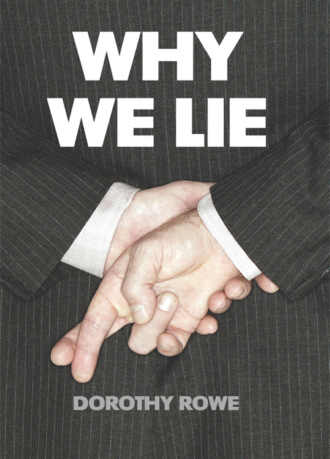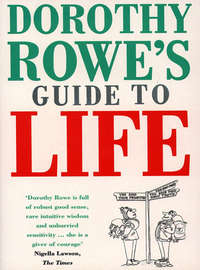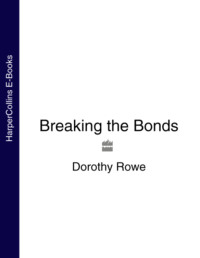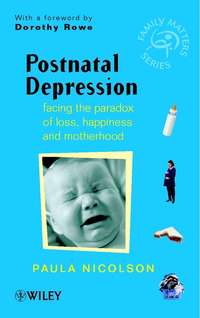
Полная версия
Why We Lie: The Source of our Disasters

DOROTHY ROWE
Why We Lie

Every aspect of our national character lives in every act of character in our homes and families. If our nation keeps secrets, so too we learn to justify the secrets that we keep. If it isn’t for national security, it’s for personal security. If it’s not civil defense, it’s a defense of ourselves. If our leaders say one thing and do quite another, well, is it any surprise that we use the excuse of their faults to cover up our own?
Harold Lloyd Goodall Jr, A Need to Know: The Clandestine History of a CIA Family
Contents
Cover
Title Page
Preface
Chapter One How Can We Know What Is True?
Chapter Two The Curious World We Live In
Chapter Three Do You Know What I Mean?
Chapter Four Why Lying Is Necessary
Chapter Five How We Learn to Lie
Chapter Six The Danger of Being Obedient
Chapter Seven Deciding What Is True
Chapter Eight How Important Is the Truth to You?
Chapter Nine Fantasies Are Important
Chapter Ten The Delights of Shared Fantasies
Chapter Eleven Special Fantasies: Beliefs and Delusions
Chapter Twelve Varieties of Lies
Chapter Thirteen The Same Old Lies
Chapter Fourteen Denying What Is There
Chapter Fifteen Hypocrites All
Chapter Sixteen Being Lied To
Chapter Seventeen Lying for Your Government
Chapter Eighteen Never Say You’re Sorry
Chapter Nineteen Some Hard Truths
Notes
Index
About the Author
Also by Dorothy Rowe
PRAISE FOR DOROTHY ROWE:
Copyright
About the Publisher
Preface
Lying has been in the news, but then it always has been. While I have been writing this book, we have had the lies of the bankers with their versions of, ‘It’s not my fault’, the lie that is based on the lie that many people tell themselves, ‘Because I am such a superior person I cannot be blamed for anything.’ This lie is based on the very popular but exceedingly stupid lie, ‘I can make reality do what I want it to do.’ As if reality ever bent to some mere mortal’s will! As I write, bankers and politicians are seeking to restore the public’s confidence in them with the delusional lie, ‘We can go back to where we were.’ We can never go back to where we were. Paranoid right-wing Americans are busy trying to spread their lie that Obama was born in Kenya and not in Hawaii as his birth certificate shows. Meanwhile, in Australia, everyone has been transfixed by the unbelievable lies told by a Federal Court judge who was caught for speeding and did not want to pay a $A77 fine (about £39) and get 3 demerit points on his licence. By the time you are reading this you will have learnt of even more amazing lies.
None of us likes being lied to. The only time we do is when we do not want to be told a particular truth that we already know, or at least suspect. We do not like to acknowledge that we lie, and do so frequently. We try to avoid using the words ‘lie’ and ‘lying’ in relation to ourselves. The only lies we willingly admit to are those we call ‘white lies’. We see these as being virtuous. We want to spare another person’s feelings, but the feelings we actually want to spare are our own. We do not want to be upset when another person becomes upset, or have that person reject us for being unkind.
Lies are words or actions that are intended to deceive other people or ourselves. We use a variety of words and phrases to hide the fact that someone is lying. If we want to seem to be very knowledgeable in matters psychological, we say about someone, ‘He’s in denial’, when in fact the person in question may be lying to himself. We can strenuously deny that certain events have happened or are happening. According to some people, the Holocaust never happened, or the climate is not changing. We can claim to hold certain views that in fact we do not hold, and defy anyone to call us hypocrites.
Why do we lie? In certain situations where your own or someone else’s life is in danger, lying can be a sensible thing to do. However, this kind of situation arises very infrequently. Most of us never encounter one. Sometimes we lie almost without thinking, but sometimes we lie in response to feeling that we are in great danger, even though there is no threat to our life. We are frightened, and so we lie.
What we see as being in danger is something we value even more than our life. It is our sense of being a person. We take our sense of being a person for granted, but we refer to it often as ‘I’ or ‘me’ or ‘myself’. It is our sense of being alive, our sense of existence. We might take it for granted but we know when it is under any threat. We move very quickly to protect it.
Each of us has experienced an extreme threat to our sense of being a person, yet we rarely talk about it. We might talk about the event itself, but not what we actually experienced. We might say, ‘I was shattered’, and our audience assume that we were using a cliché, but we were not. We might say, ‘I was panicking’, and our audience assume that we were exaggerating for effect. Very likely our audience were resisting hearing what we were saying because they did not want to be reminded of something terrible in their own life.
We have all had the experience of discovering that we are wrong in our assessment of our situation. It might be that you are being denied by someone the respect you feel you deserve, and you are being humiliated. It might be that the person you depend on and love has disappeared from your life, or has harmed or betrayed you. It might be that you discover that your future will not be what you planned it to be, or that your past proves not to be what you thought it was. In all of these situations, you discover that you have made a serious error of judgement. There is a huge discrepancy between what you thought your life was and what it actually is. As soon as you discover your mistake, you feel shaky, very shaky. Something inside you is falling apart. As the implications of your mistake become increasingly clear, the shakiness intensifies. Anxiety turns to fear, and fear to terror as you feel that you are shattering, crumbling, even disappearing.
Of course, you do not actually crumble and disappear, but you do change. You might now be older and wiser, or perhaps not wiser, but you do see things differently. From then on, you try to make sure that you never have such an experience again. Whatever your circumstances, consciously or unconsciously, you are watching for the slightest hint that such a situation might occur again. You develop many different skills aimed at deflecting such a possibility, or, when it does threaten to recur, to protect yourself from its impact. The simplest and easiest skill to employ is lying. However, no matter how skilled you are as a liar, it is rarely sensible to lie.
This is not a book about the morality of lying. I am not concerned with comparing the vice of lying with the virtue of telling the truth, nor with examining what God or Allah said about lying. Nor do I want to discuss lying in the abstract, as many moralists do. I am concerned with why we lie, and the consequences of our lies. We are very foolish indeed if we lie and fail to think about what the consequences will be.
While many thousands of people are struggling with the consequences of the terrible lies told by George Bush, Dick Cheney and Tony Blair, Bush is being paid handsomely to give lectures to his supporters, Cheney is on the talk-show circuit, warning of the terrorist threat that is even greater now, something, he says, that Obama fails to recognize. Like Bush, Blair is enjoying some very lucrative directorships and lecturing engagements. He has established his Faith Foundation, and been appointed Envoy to the Middle East to establish peace and reconciliation there. This appointment is the equivalent of the appointment of Sir Fred Goodwin, who played a major part in setting in train the economic crisis in Britain, to be in charge of a new body to regulate British banks. However, his experiences of the last few years have changed Blair. The journalist Decca Aitkenhead spent a day with Peter Mandelson, and, in the course of that day, they visited Blair. She wrote,
When we arrive I’m completely taken aback at the former PM’s appearance, for he resembles a bad actor playing Blair in the grip of some awful psychiatric meltdown. He really does look quite mad, with his face all over the place – a grotesque dance of eyebrows and teeth, manically gurning away, every feature in permanent motion – beside which Mandelson looks like a vision of poised sophistication. There are warm greetings, and as I’m introduced Mandelson pretends I’m there to shadow Blair, provoking another great jerky grimace.1
Blair, Bush and Cheney made the grave mistake of forgetting that everything we do has a whole network of consequences, most of which we never anticipated. Even when we get what we wished for, it is never quite what we wanted. The lies we tell might protect us in the short term, but, in the long term, the consequences can be disastrous. When we lie to ourselves, we multiply a thousandfold the inherent difficulties we have in trying to determine what is actually going on inside us and around us. Good relationships are based on trust. When we lie to others, sooner or later, our lies will become apparent, and trust is destroyed.
On his twenty-third birthday in 1978, Timothy Garton Ash drove to West Berlin and some time later went to live for a while in East Berlin where he soon attracted the attention of the Stasi, the secret police. When the Berlin Wall fell in 1989 the Stasi files were opened, and those who had been spied upon could apply to see their own file. Garton Ash read his own file, and from that the files on those who had spied on him. All of those who had spied on him were ordinary Germans whom he had met, sometimes socially, sometimes in connection with his research for his doctoral thesis on Berlin under Hitler. One of the spies was code-named Michaela. She had been director of the Weimar Arts Galleries. After studying his and Michaela’s files, he went to see her. During their conversation it became clear that the Stasi had tempted her with promises of trips to art galleries outside East Germany, places where few East Germans were allowed to go. She let herself be seduced, and pretended to herself that what she was doing was harmless. She must also have told herself that no one would ever know. She had not learnt from history that all tyrannies eventually come to an end. Amongst those she spied on were her daughter and her step-daughter, and the men with whom they were associated. When the Wall came down her step-daughter read her own file, and severed her ties with her step-mother. Garton Ash did not record what Michaela’s daughter did when she discovered that her own mother had spied on her, but we can surmise.2
Relationships can be very complicated, and consequently many people limit the number and kind of people to whom they will pay attention. Some people decide that, ‘Anyone who isn’t family doesn’t count’, or, ‘I don’t want to have anything to do with anyone who isn’t the same nationality as me.’ People who decide to treat as important only those who are family, or those who share their nationality, religion, race, class live in what Gillian Tett calls ‘silos’, those huge, windowless cylinders that stand, often in complete isolation, perhaps full of wheat, perhaps empty, beside a single rail track in the Australian Outback.
Gillian Tett is Capital Markets Editor of the Financial Times and winner of the British Press Award 2008 for the business journalist of the year. She was one of the few people who predicted two years ago the collapse of the world’s financial system. Five years ago when all the talk in the City was about mergers and acquisitions, and the equity markets, she became interested in collateral debt obligations (CDOs) and credit default swaps (CDSs), the products that proved to be the bad debts acquired by banks and building societies. Tett had trained as an anthropologist. In an interview, she explained how anthropologists are trained to think holistically.
You look at how all the bits move together. And most people in the City don’t do that. They are so specialized, so busy, they just look at their own little silos. And one of the reasons we got into this mess we are in is because they were so busy looking at their own little bit that they totally failed to understand how it interacted with the rest of society. Bankers like to imagine that money and the profit motive is as universal as gravity. They think it’s basically a given and they think it’s completely apersonal. And it’s not. What they do in finance is all about culture and interaction.3
Everything in the world is connected to everything else. In early 2009 the car industry was in trouble. The demand for new cars had dropped to its lowest levels, as people faced their own individual financial crisis. News reports spoke of ‘the American car industry’, ‘the Japanese car industry’, and the like, as if these were discrete industries, but they were not. The car industry is a global industry. For instance, in the motor industry in 2009, Fiat provided diesel engines to Mercedes for use in commercial vehicles. GM built Fiat diesel engines under licence for use in Vauxhall, Opel and Saab cars. Peugeot Citroen provided diesel engines for Ford vehicles and used BMW petrol engines in its Citroën and Peugeot cars, while running Joint Venture programmes for shared small cars with Toyota and commercial vehicles with Fiat.4
In January 2009, the World Economic Forum met in closed session at Davos in Switzerland. Tim Weber, the Business Editor for the BBC website, was allowed to report what was said, but not who said it. There was general agreement that the root causes of the crisis were ‘too much debt, a culture of short-term rewards for long-term risk-taking and fatally flawed mathematical models. And plain old greed.’ One speaker who did allow his name to be used was Nassim Nicholas Taleb, a former derivatives trader and now writer, who said, ‘Derivatives trading is all about how to make a bonus and how to screw your client.’ It became clear that, ‘Financial institutions took on debt worth 40 times their assets – and failed to understand how risky this was.’5 When financial institutions became computerized, they acquired software that produced ‘models’ that purported to predict the outcome of certain financial activities, that is, what risk was being run by these financial activities. The model was an abstract concept called value at risk (VAR). When VAR included the kinds of crises that occur once in a lifetime, the result would suggest that the venture to be undertaken was far too risky. If once-in-a-lifetime crises were not included, the result suggested that it was fine to undertake what Paul Mason, Economics Editor of BBC Newsnight, called ‘suicidal risk-taking’.6 This was the kind of risk-taking that financial institutions preferred. After all, it won’t happen, will it? But it did.
The unexpected often happens in private and public life. Everyone should know that from their own personal experience. Yet many people tell themselves the comforting lie, ‘My actions will have limited consequences.’ We learn as children that small actions can have surprisingly large and unexpected results, yet in adulthood many people pretend that they never knew this. When three windows of Sir Fred Goodwin’s large home were smashed, as was the rear window of his Mercedes parked in the driveway, Sir Fred was reported to be ‘shaken’. Why would people do a thing like that? Sir Fred, when head of the Royal Bank of Scotland, had plunged the bank into ruinous debt, resulting in the bank having to be propped up by £20 billion of public money. When he resigned, he could see no reason why he should not keep his £3 million tax-free lump sum as well as his £700,000 a year pension.7 Why would that lead to people feeling so angry that they destroyed his property? When people tell themselves, ‘My actions will have limited consequences’, they have usually already constructed a fantasy about what those limited consequences will be. Perhaps Sir Fred had a fantasy about a very pleasant early retirement with a few lucrative directorships and the occasional attendance at some committee of the Great and the Good. Apparently, Sir Fred had no idea that some people might hate him so much they would try to harm him, nor that for the rest of his life he would be pursued by the paparazzi. In March 2009 the world’s media were offering the top price for a photograph of Sir Fred relaxing. By August he was back in Edinburgh. According to Phillip Inman of the Guardian, writing in October 2009, ‘He has turned to PR experts to rebuild his reputation, as yet to no avail.’8
The universal and most popular lie we tell ourselves is, ‘I am superior to other people.’ Many people claim this superiority because they hold certain beliefs about their religion, race, nationality, class or gender, while others claim their superiority simply because they were born into a certain family. All feel that this superiority entitles them to patronize, denigrate, ignore, cheat, or harm those whom they see as their inferiors. In clinging to this lie, they deny the similarities we all share. Our species varies very little genetically, and we have the same needs, desires and fears. We all want to be recognized for being the person that we are, to have a respected role in our society, and to enjoy good relationships with others.
All the immense problems we face today – a global financial crisis, climate change along with the pollution and despoiling of the planet – derive from the way certain people have told themselves that they are superior to the people they are harming, and therefore entitled to do what they do. When the British, Germans, French, Dutch, Spanish and Portuguese established their empires, they told themselves that they were rescuing those they colonized from their ignorance and degradation, and they were saving their souls, when the truth was that these empire builders were engaged in theft on a massive scale. Believing that merely having a religious faith is sufficient to show that you are both virtuous and superior has allowed vast numbers of people to harm others and feel no shame. Lying to ourselves is very easy, and we can always think of a lie that seems to allow us to do what we do.
Can we change?
As religious leaders have demonstrated down the centuries, exhortations to be virtuous rarely change people’s ideas about how they should behave. It is always easy to deplore other people’s behaviour, but we are not inclined to change our own behaviour at the behest of those who see themselves as having moral authority. Threats of punishment by the law can lead us to appear to change, but we simply keep our ideas to ourselves. Under Communist rule many people made an ‘inner emigration’ and lived an unpolitical life.9 People change their ideas when they voluntarily examine their own ideas and the consequences of their ideas, and decide to change.
In the course of my work I have seen many individuals decide to change how they saw themselves and their world so that they now live a much more satisfactory life. In Germany there have been some profound changes in ideas. Many countries with pasts that many of their inhabitants want to forget or deny have tried to deal with their legacy by holding some kind of inquiry, but the Germans dealt with life under Communist rule with Germanic thoroughness. Garton Ash wrote, ‘Germany has had trials and purges and truth commissions and has systematically opened the secret police files to each and every individual who wants to know what was done to him or her – or what he or she did to others. This is unique.’10 In his conclusion written in 2009, Garton Ash pointed out that, since 1997, the technological revolution has put into the hands of the British and American governments, and into the hands of private security firms the means of spying on individuals that are far beyond what Nazi and Communist leaders could ever have imagined. He wrote, ‘East Germans today have their privacy better protected by the state than we do in Britain. Precisely because lawmakers and judges know what it was like to live in a Stasi state, and before that a Nazi one, they have guarded these things more jealously than we, the British, who take them for granted. You value health most when you have been sick.’11
In 2009 when the BBC correspondent Mark Mardell was leaving his post in Europe, he wrote what he called a final essay on Europe. There he said, ‘Germany is still the most important economic and political power in Europe, but with a sense of responsibility, an ability to reflect upon its past, a horror of war, that is I think unique and little short of a miracle, an outcome few historians studying the aftermath of past conflicts could even have dared to predict. It’s probably the most grown-up country in the world today.’12
Another change in how people think began in the 1970s with what then was called self-help. People with problems such as poor housing or chronic illness lost patience with the experts who were supposed to be helping them, and got together with others suffering in the same way to solve the problem they shared. Some of these self-help groups became movements, many of which effected the changes they sought. In her book The Wisdom of Whores the extraordinarily truthful epidemiologist Elizabeth Pisani, writing about AIDS, said, ‘It wasn’t doctors who kick-started the response to this infectious disease, it was gay men. With a flair for dramatic presentation and an inside knowledge of what makes the communications industry tick, they battered down the doors of the medical establishment, assaulted the pharmaceutical industry, took the press by storm. They gave AIDS a political face.’13
The Internet and the World Wide Web revolutionized how people communicate with one another. Politicians, media moguls and the police have been forced to adapt themselves, though not without complaint, to the power of disparate groups of people all around the world. Here in London the police might have changed from using force to a softly softly approach with the people in the Climate Change movement, but whether they understand and accept what the Climate Change people are doing is another matter.
Unfortunately, many of those who organize for a cause have not learned from history. Neither exhortations nor the presentations of facts will force people to change how they think. To get people to change, you have to understand how they see themselves and their world. You must never assume that you know how another person thinks and feels. The only way to discover this is to ask that person and, if he trusts you, he will tell you.
The greatest change in ideas that I have witnessed is in how parents see their children. This was not a world-wide revolution, and the majority of children are still in servitude to their parents who see them as possessions to be used as they see fit, but a significant number of parents changed their views about how children should be raised, and this changed the society in which they lived.
The revolution that led people to question the power of parents began in the 1950s when an American paediatrician, Benjamin Spock, put forward the dangerous idea that parents should not punish children three years or younger for failing to do something that was physiologically impossible for them to do, that is, have voluntary control over their bladder and bowels. Children need to learn how to do this in their own good time. Hard on the heels of Dr Spock came T-groups, consciousness-raising groups and a plethora of therapies. All these activities gave the participants permission to break the Fifth Commandment, ‘Honour thy father and mother, so that your days be long in the land.’ Criticize your parents and you’re dead. This led these people to wonder whether, since they had suffered at the hands of their parents, they should now think hard about how they should raise their own children. Now, when I see a child doing something that would have earned me as a child a hard slap or worse from my mother, and instead the child’s mother engages the child in conversation or distracts the child, I want to tell her how wonderful she is. I refrain from doing this in case I embarrass her. After all, she was simply doing what her mother had done when she was a child.





